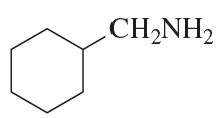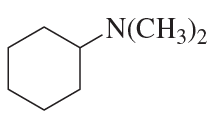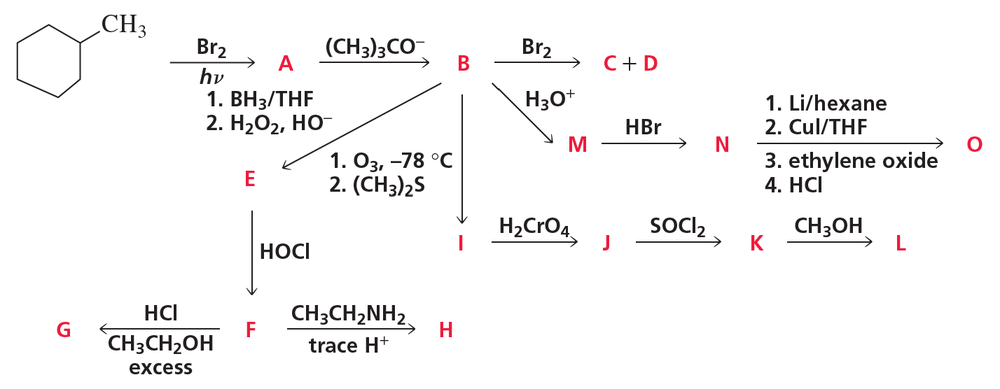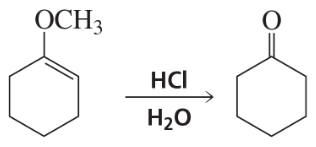 Back
Back Bruice 8th Edition
Bruice 8th Edition Ch. 16 - Reactions of Aldehydes and Ketones More Reactions of Carboxylic Acid Derivatives
Ch. 16 - Reactions of Aldehydes and Ketones More Reactions of Carboxylic Acid DerivativesProblem 60e
Using cyclohexanone as the starting material, describe how each of the following compounds can be synthesized:
e.
Problem 60f
Using cyclohexanone as the starting material, describe how each of the following compounds can be synthesized:
f.
Problem 62a
Show how each of the following compounds can be prepared, using the given starting material:
a.
Problem 62c
Show how each of the following compounds can be prepared, using the given starting material:
c.
Problem 62e
Show how each of the following compounds can be prepared, using the given starting material:
e.
Problem 62f
Show how each of the following compounds can be prepared, using the given starting material:
f.
Problem 63
Fill in the boxes:
Problem 64a
Thiols can be prepared from the reaction of thiourea with an alkyl halide, followed by hydroxide-ion-promoted hydrolysis.
a. Propose a mechanism for the reaction.
Problem 64b
Thiols can be prepared from the reaction of thiourea with an alkyl halide, followed by hydroxide-ion-promoted hydrolysis.
b. What thiol will be formed if the alkyl halide employed is pentyl bromide?
Problem 65a
Identify A through O:
Problem 65b
Identify A through O:
Problem 65c
Identify A through O:
Problem 65d
Identify A through O:
Problem 65e
Identify A through O:
Problem 65f
Identify A through O:
Problem 65g
Identify A through O:
Problem 65h
Identify A through O:
Problem 66e,f
What are the products of the following reactions?
e.
f.
Problem 66i
What are the products of the following reactions?
i.
Problem 66j
What are the products of the following reactions?
j.
Problem 67
The only organic compound obtained when compound Z undergoes the following sequence of reactions gives the 1H NMR spectrum shown. Identify compound Z.
<IMAGE>
Problem 68a
Propose a mechanism for each of the following reactions:
a.
Problem 68b
Propose a mechanism for each of the following reactions:
b.
Problem 69
How many signals would the product of the following reaction show in
a. its 1H NMR spectrum?
b. its 13C NMR spectrum?
Problem 70
Fill in the boxes with the appropriate reagents:
Problem 71
Rank the following compounds from most reactive to least reactive toward nucleophilic addition:
Problem 72a
How could you convert N-methylbenzamide to the following compounds?
a. N-methylbenzylamine
Problem 72b
How could you convert N-methylbenzamide to the following compounds?
b. benzoic acid
Problem 72c
How could you convert N-methylbenzamide to the following compounds?
c. methyl benzoate
Problem 72d
How could you convert N-methylbenzamide to the following compounds?
d. benzyl alcohol

















